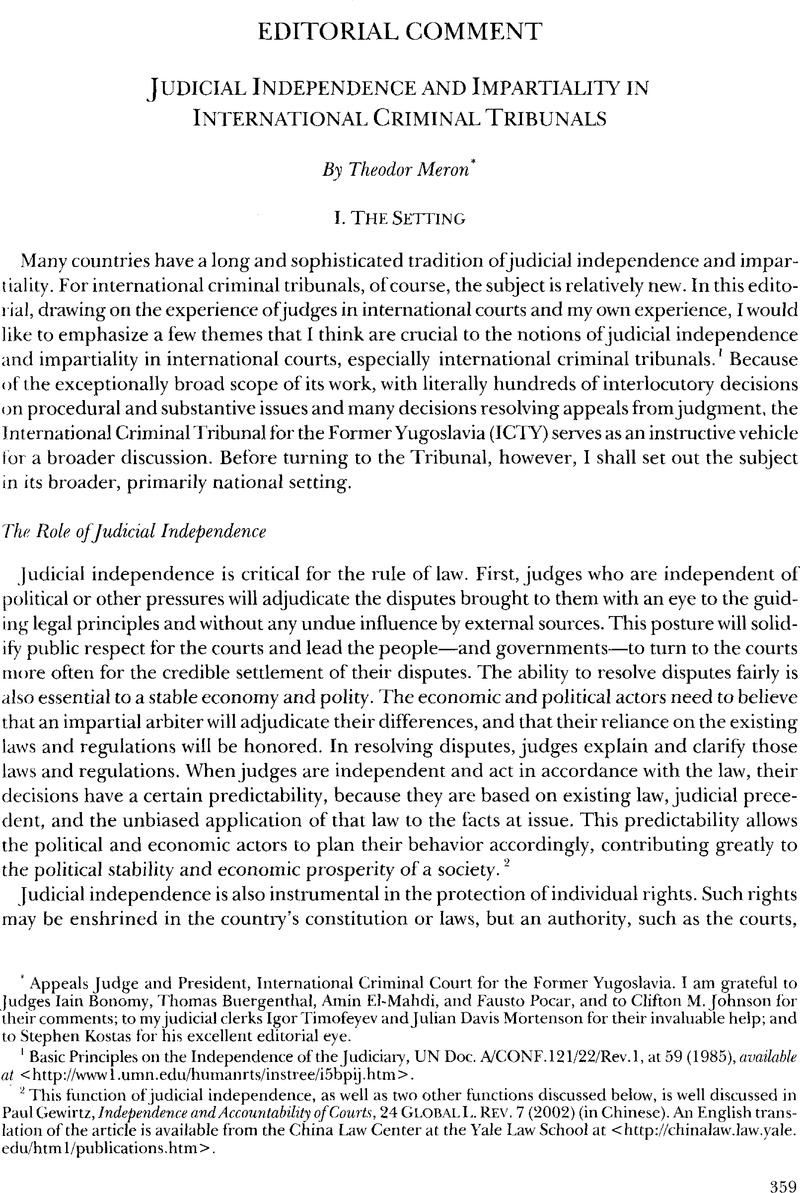Article contents
Judicial Independence and Impartiality in International Criminal Tribunals
Published online by Cambridge University Press: 27 February 2017
Abstract

- Type
- Editorial Comments
- Information
- Copyright
- Copyright © American Society of International Law 2005
References
1 Basic Principles on the Independence of the Judiciary, UN Doc. A/CONF.121/22/Rev.1, at 59 (1985), available at <http://www1.umn.edu/humanrts/instree/i5bpij.htm>.
2 This function of judicial independence, as well as two other functions discussed below, is well discussed in Paul Gewirtz, Independence and Accountability of Courts, 24 Global L. Rev. 7 (2002)Google Scholar (in Chinese). An English translation of the article is available from the China Law Center at the Yale Law School at <http://chinalaw.law.yale.edu/html/publications.htm>.
3 Cullen, Lord, The Judge and the Public, 1999 Scots L. Times (News) 261, 261–62Google Scholar.
4 Id. at 262.
5 Starrs v. Ruxton, 1999 Scot. Grim. Gas. Rep. [SGCR] 1078 (H.C.J.).
6 Id. at 1079.
7 Id. at 1080.
8 Kearney v. Her Majesty’s Advocate, No. XC917/03 (Scot. H.C.J. Dec. 17, 2004) (unpublished).
9 Statute of the International Criminal Tribunal for the Former Yugoslavia, SC Res. 827, annex, Art. 13 bis (May 25, 1993), 32 ILM 1203 (1993), as amended through May 19, 2003, available at <http://www.un.org/icty> [hereinafter ICTY Statute].
10 ICJ Statute Arts. 7–10; Rome Statute of the International Criminal Court, July 17, 1998, Art. 36, 2187 UNTS 3 [hereinafter ICC Statute].
11 ICJ Statute Art. 13(1); ICTY Statute, supra note 9, Art. 13 bis(3).
12 ICC Statute, supra note 10, Art. 36(9)(a), (b).
13 European Convention lor the Protection of Human Rights and Fundamental Freedoms, Nov. 4, 1950, Art. 23(1), Eur. TS No. 5, 213 UNTS 222 (entered into force Sept. 3, 1953); Treaty Establishing the European Community, Mar. 25, 1957, Art. 223, 298 UNTS 11, as amended by Treaty of Nice, Feb. 26, 2001, 2001 O.J. (C 80) 1, consolidated version, 2002 O.J. (C 325) 1.
14 United Nations Convention on the Law of the Sea, opened for signature Dec. 10, 1982, Annex VI, Art. 5, 1833 UNTS 397, 561 (entered into force Nov. 16, 1994).
15 ICC Statute, supra note 10, Art. 61(11); Regulations of the Court, May 26, 2004, UN Doc. ICC–BD/01–01–04, Art. 46, available at <http://www.icc–cpi.int>.
16 See the following provisions of the ICTY Statute, supra note 9. Article 12(3): “Seven of the permanent judges shall be members of the Appeals Chamber. The Appeals Chamber shall, for each appeal, be composed of five of its members.” Article 14(3): “After consultation with the permanent judges of the International Tribunal, the President shall assign four of the permanent judges elected or appointed in accordance with Article 13 bis of the Statute to the Appeals Chamber and nine to the Trial Chambers.” And Article 14(4):
Two of the permanent judges of the International Tribunal for Rwanda elected or appointed in accordance with article 12 bis of the Statute of that Tribunal shall be assigned by the President of that Tribunal, in consultation with the President of the International Tribunal, to be members of the Appeals Chamber and permanent judges of the International Tribunal.
17 Id., Art. 12(2). As president, I have the authority to assign judges from one chamber to another, but this power is seldom exercised because judges sit on multiple cases at any given time, and to move them among the chambers would be disruptive and might result in contamination. See ICTY Rules of Procedure and Evidence, as amended, UN Doc. IT/32/Rev.32, Rule 27(C) (2004) [hereinafter Rules] (permitting the president “at any time temporarily [to] assign a member of a Trial Chamber or of the Appeals Chamber to another Chamber”).
18 ICTY Statute, supra note 9, Art. 14.
19 Id., Art. 14(2).
20 UN Doc. S/PV.4838, at 30 (2003).
21 See Regina v. Bow Street Metropolitan Stipendiary Magistrate, ex parte Pinochet Ugarte, [1999] 1 All E.R. 924 (H.L.) (Pinochet II).
22 Rex v. Sussex Justices, ex parte McCarthy, [1924] 1 K.B. 256, 259.
23 See, e.g., Breyer, Stephen G., Judicial Independence in the United States, 40 ST. Louis U. L.J. 989, 994 (1996)Google Scholar.
24 Legal Consequences of the Construction of a Wall in the Occupied Palestinian Territory, Order (Int’l Ct. Justice Jan. 30, 2004).
25 Prosecutor v. Furundžija, Judgment, No. IT–95–17/1–A, paras. 169–70 (July 21, 2000).
26 Id.
27 Id., para. 189.
28 Id.
29 Prosecutor v. Sesay, Decision on Disqualification of Justice Robertson from Appeals Chamber, No. SCSL– 2004–15–AR15, paras. 1–6 (Mar. 13, 2004) (quoting Geoffrey Robertson, Crimes Against Humanity—The Struggle For Global Justice (2002)).
30 Id., para. 18.
31 Id., para. 15 (stating that “[t]he crucial and decisive question is whether an independent bystander so to speak, or the reasonable man, reading [the relevant passages from Crimes Against Humanity] will have a legitimate reason to fear that Justice Robertson lacks impartiality”).
32 Hoekstra v. Her Majesty’s Advocate, 2000 SCCR 367, 368 (H.C.J.).
33 Id. at 382.
34 Prosecutor v. Delalić, Judgment, No. IT–96–21–A, para. 677 (Feb. 20, 2001).
35 Id., para. 683.
36 Id., para. 684.
37 Rule 15(B) of the Rules, supra note 17, states:
Any party may apply to the Presiding Judge of a Chamber for the disqualification and withdrawal of a Judge of that Chamber from a trial or appeal upon the above grounds. The Presiding Judge shall confer with the Judge in question, and if necessary the Bureau shall determine the matter. If the Bureau upholds the application, the President shall assign another Judge to sit in place of the disqualified judge.
38 Cullen, supra note 3, at 263.
- 19
- Cited by


